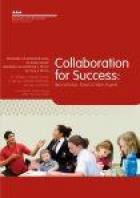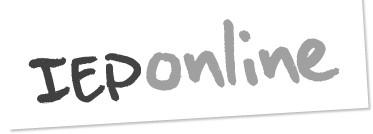About
Who benefits from this resource?

This resource is for anyone involved in developing or implementing individual education plans (IEPs) to support students with special education needs.
The audience includes:
- students
- their parents/caregivers and members of their whānau, hapū, iwi, or other communities
- school staff (including teachers, teacher aides, and school leaders)
- specialists.
Māori-medium schools might adopt pathways different from those suggested in this resource, in accordance with their kaupapa. “Cultural differences in the perception of special needs” may be a factor. (Bevan-Brown, 2001, page 6)
Collaboration - the heart of the matter – tab on this page that includes suggestions for collaborating with Māori communities.
Purpose of the resource

Collaboration for Success: Individual Education Plans (September 2011)
This new resource is a reference to current New Zealand research, policy, and effective practice in supporting students with special education needs.
Anyone involved in developing or implementing individual education plans (IEPs) will benefit from this publication.
NOTE: This document replaces the 1998 Individual Education Programme (IEP) Guidelines.
Rationale for updating the IEP Guidelines
Important changes have taken place in the education and disability sectors since the IEP Guidelines were published in 1998.
This 2011 resource has been developed to incorporate the principles and practical applications of those changes. It highlights activities that lead to improved student progress and achievement.
The changes include the following.
New Zealand Disability Strategy 2016-2026
Guides the work of government agencies on disability issues
The vision of the strategy: New Zealand is a non-disabling society – a place where disabled people have an equal opportunity to achieve their goals and aspirations, and all of New Zealand works together to make this happen. You can download a PDF, Word, or large print version.
New Zealand Curriculum
Guide to teaching practice in English-medium schools.
This is an official policy relating to teaching and learning that sets the direction for student learning and guides schools as they design and review their curriculum. You can downloadable PDF of the document.
Te Marautanga o Aotearoa
Guide to teaching practices in Māori-medium schools in New Zealand
You can download a PDF for each of these:
- Te Marautanga o Aotearoa
- Te Marautanga o Aotearoa: He Whakapākehātanga.
Implementation of the Convention in New Zealand
NZ’s implementation of the United Nations Convention on the Rights of Persons with Disabilities
Learn more about how the process for reporting on the Convention and what New Zealand has done to date.

Success for All – Every School, Every Child (2010)
Government’s vision of a fully inclusive education system by 2014. You can download a PDF in the 'Vision, policy and principles' section of this page
Review of literature on IEPs
Literature review of national and international developments in the use of the Individual Education Plan (IEP) with schools and families
Literature Review
In 2010, the Ministry of Education commissioned a review of literature around IEPs to inform their future use (Mitchell, Morton, and Hornby, 2010). Summary evidence from the review appears in the relevant sections of this document.
The literature review focuses on:
- national and international developments in IEP processes
- assessment practices in special education
- research into effective, evidence-based IEP practices.
The review identifies a number of positive aspects of New Zealand practice. However, it also notes gaps between the original vision for IEPs and current implementation.
It shows that many opportunities for improvement exist. This resource aims to capture and build on those opportunities.

